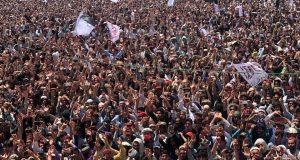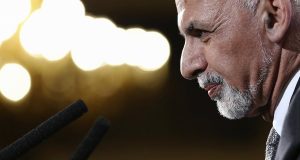The tale of independence and partition of India has been trumpeted and touted by different narrators. It is up to the story-teller who makes it reflect each time in a divergent version. When we turn over leafs of the text books– which are drilled into schooling-minds at school and colleges levels – plethora of questions bubble up out of the text. There is a tongue-tide selective version of story championed that gravely shelved movements, legends and heroes. Once established, nation states start re-ordering history and an unprecedented mutation of history takes place.
Changes in the narration of history within a nation-state occur in much the same way as changes appear in languages. Both Language and history are reified and given an aura of permanence by codification in the written word. However, both mutate and evolve through changes resulting from multiple processes acting and interacting (Keith, 1991).
The chronicles of history witness that – in both colonial and post-colonial (nation-state) narratives – movements and heroes at the margins are rarely reported. Post-colonial histories taught in the curricula books in Pakistan project selective characters as heroes, while it negates and sometimes diabolically stigmatizes others as traitors and anti-protagonists.
Although, the anti-imperialist movements stemmed in nonviolence and pacifism were dealt with acute brutality by the colonial masters, same is repeated, such movements and heroes are excluded from the annals of history written under the auspices of nation state. Especially the movements and struggles waged by Bacha Khan (1890-1988) and Abdul Samad Khan Achakzai (1907-1973) are one of those key missing links.
Abdul Samad Khan, also dubbed as “Khan Shaheed” is one of the most prominent but unsung protagonists made invisible from the leaf of history. While remembering him on the 43rd death anniversary, it is sine qua non to redraw his sketch out of the relics of oral and written history rarely read and heard.
Born in 1907, Khan raised and studied in the muddy village of “Enayatullah Karez” locates at a cross roads of empires. The term Ferangi was not alien to him even during his childhood; he was told the stories of his forefather “Ghazi Abdullah Khan” the Stalwart leader who marshalled the undisciplined Afghan tribes against the British occupiers that incurred grave disasters to the British military and camp followers during 1842. Same was the case with the sagas of Second Anglo-afghan War (1879), while he observed the regimentation of Pashtuns against British army in the Third Anglo-Afghan War (1919) that was successfully lasted with the emancipation of Afghanistan.
His three-volume autobiography unveils that even as in adolescence, Khan Shaheed got a great wisdom of understanding and unpacking exploitative mechanism; substantially imbedded by the five hundred years old empire and the Pashtun code of life “Pashtunwali”. The time Khan Shaheed dwelled-in was utterly pervaded with pigeonholes and he started unsheathing his sword by challenging those socially constructed stereotypes. There were several irrational suppositions and myths, like growing trees at home attract monsters, rulers cannot rule until they are allowed by saints, etc. The paranoia of genie was overwhelming. This abysmal state could not let him stay alien to these menaces of the society he walked-in, nullified these baseless narratives by untying all knots of fear and horror.
The reckoned Pashto poet and writer Darwesh Durrani has artistically spelled his two pronged struggles, that is with genie and ferangi (perai aw ferangai). His political career was started even at school time. Although he studied at school till class 8th, but his journey of seeking knowledge did not stop throughout his life as free man or in chain behind the bars.
At the dawn of his adolescence, there was unparalleled political mobilization in the unhalved India. Khilafat movement was in its full swings and Muslims across India– Dar al-Harb territory of war or the land for holly wars – launched migration to Afghanistan (The land of Islam). In 1924 he along with his legion of fellows travelled to Sindh and Panjab and closely studied the momentum of anti-imperialism movements. In the following year (1927 -31),Khan Shaheed frequently visited India, deeply studied political situations and carried out series of consultations, dialogues and discussion with different leaders including Gandhi, Bacha Khan, Nehru, Abulkalam Azad, etc. He studied indigenous movements erupted through traditional societies. It also figured out a paradigm shift in his strategy for seeking freedom. He confesses in his autobiography that: “In 1930 I decided to completely abandon the option of experiencing violence as mean for seeking rights and emancipation.”
His emergence as a dedicated political and social activist was now evident. He strongly ratified the civil disobedience movement manoeuvred by Congress, and therefore was no more tolerated by the British authorities and imprisoned him in 1930 for almost a year. In 1931, he coined the idea of creating close liaison between Pashtun and Baloch to fight out their common enemy. All India Baloch and Balochistan Conference was an offshoot that was held in 1933. As seasoned politician and mentor, Khan presided over the conference whereas resolution of the conference was chalked out for the desires of the Pashutn and Baloch living at the important geopolitical territory of British India. The conference proved a fountainhead for a vivid momentum and several political organizations and use of media was figured. Khan was apprehended for the second time and remained in jail for up to three years (1934-36).
The excruciating experiences of Khan Shaheed in Mach Jail were yet to over, the tiding news of catastrophic May 31 Earthquake herald; which bitterly shattered the ‘Once Little Paris’- alias Quetta – wherein the City nearly lost its sons of the soil with no exception to his closest comrade Yousaf Aziz Magsi (1908-1935).
After getting released from prison, Khan expedited his struggles. He established the first ever “Azizia Press” after his great Baloch comrade and published the first newspaper “Istiqlal” from Quetta before which the province monologue with itself. Meanwhile, he materialized the idea of incepting an organization “Anjuman-e-Watan” in order to lead a systematic efforts for unfettering his nation of tyrannical clutches of the British. This organization fostered novel political activists from diverse ethnic, religious, and gender backgrounds. Till 1938, the organization proved the essence of its existence and was largely recognized across subcontinent.
His quest for seeking independence and shattering imperialism sustained till India and Pakistan won freedom. He was arrested and detained for more than five years during the reign of British India.
After the independence, when Pakistan came into being, Khan Shaheed along with Bacha Khan had to suffer more heavily for their closed ties with Congress. Although, the leadership of Jamiat-e-Islami and Jamiat-e-Ulema Hind was the hard core members of All India National Congress, but the wrath of post-independence rulers strictly fallen down only on Pashtun nationalists after Pakistan coming into being.
Khan was detained almost for 23-year that stretched from March 1948 till ended on February 1969. Meanwhile he was imprisoned for five times with utmost distress and coercion. In the post-colonial era, he had a desire to regulate governance through a just federation representing the desires and needs of the administrative units. His struggles for democracy, good governance, formulation of provinces on historical and cultural lines and autonomy of administrative units did not suit the establishment that was seeking power through back doors. His indefatigable struggles let the rulers with no option but to strike him physically and he was assassinated in cold blood at his residence on December 2nd 1973.
His post-colonial struggles fostered organizational basis for Pashtun Nationalism that seeks dignified positions and conditions of the repressed and neglected nations which constitute the nation-state of Pakistan. His unflinching stance for a democratic and just autonomous federating unites is still highly relevant and provides guiding principles to the contemporary legislators and policy makers.
 Pashtun Times Latest News
Pashtun Times Latest News






